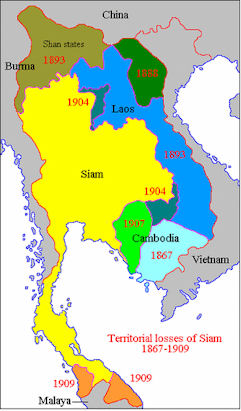

Zitierweise / cite as:
Payer, Alois <1944 - >: Chronik Thailands = กาลานุกรมสยามประเทศไทย. -- Chronik 1868-01 - 1868-10 (Rama IV.). -- Fassung vom 2016-12-02. -- URL: http://www.payer.de/thailandchronik/chronik1868a.htm
Erstmals publiziert: 2013-07-11
Überarbeitungen: 2016-12-02 [Ergänzungen] ; 2015-09-13 [Ergänzungen] ; 2015-05-19 [Ergänzungen] ; 2015-04-22 [Ergänzungen] ; 2015-03-18 [Ergänzungen] ; 2014-12-18 [Ergänzungen] ; 2014-03-31 [Ergänzungen] ; 2014-03-01 [Ergänzungen] ; 2013-10-31 [Ergänzungen] ; 2013-10-06 [Ergänzungen] ; 2013-09-29 [Ergänzungen]
©opyright: Dieser Text steht der Allgemeinheit zur Verfügung. Eine Verwertung in Publikationen, die über übliche Zitate hinausgeht, bedarf der ausdrücklichen Genehmigung des Herausgebers.
Dieser Text ist Teil der Abteilung
Thailand von
Tüpfli's Global Village Library
ช้างตายทั้งตัวเอาใบบัวปิดไม่มิด
|
Gewidmet meiner lieben Frau Margarete Payer die seit unserem ersten Besuch in Thailand 1974 mit mir die Liebe zu den und die Sorge um die Bewohner Thailands teilt. |
|
Bei thailändischen Statistiken muss man mit allen Fehlerquellen rechnen, die in folgendem Werk beschrieben sind:
Die Statistikdiagramme geben also meistens eher qualitative als korrekte quantitative Beziehungen wieder.
|
1868
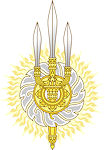
Abb.: Carte de visite von Rama IV., 1868
Abb.: Kinder Rama's IV., ca. 1868
1868
Abb.: Siamesin, 1868
1868
Erste Schätzung der Staatseinnahmen während der ganzen Regierungszeit von Rama IV.: 8 Mio. Baht.
1868 - 1872
Es erscheint das Jahrbuch
Bangkok Calendar. -- Bangkok : Press of the American Missionary Association. -- 1868 - 1872
"What the Bangkok people importet from Europa, the Laos either made themselves or did without." [Zitiert in: Battye, Noel Alfred <1935 - >: The military, government, and society in Siam, 1868-1910 : politics and military reform during the reign of King Chulalongkorn. -- 1974. -- 575 S. -- Diss., Cornell Univ. -- S. 76]
1868
190 westliche Ausländer stehen in siamesischen Staatsdiensten, über die Hälfte bei der Marine, zwei beim Heer. Viele der Ausländer sind unqualifizierte, aber umso eingebildetere Abenteurer. Sie halten Paraden und dergleichen ab, die von ausländischen Besuchern als Parodien empfunden werden. Sie lassen คด เสฟ ถิ ขวีน ("God save the Queen") als siamesische Königshymne singen und dergl.
1868
Inbetriebnahme des Kanonenboots "Siam Supporter". Es ist eine siamesische Konstruktion mit 8 Kanonen. Eine ausländische Besatzung soll siamesischen Nachwuchs ausbilden. 1870 scheitert das Ausbildungsprogramm an zu hohen Lohnforderungen westlicher Ausbilder.
1868

Vertrag mit der schwedisch-norwegischen Union.
Abb.: Schwedisch-norwegische Union 1815
[Bildquelle: Wikipedia. -- Public domain]
1868

Vertrag mit Belgien.
Abb.: Belgien seit 1831
1868
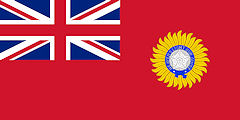
Vertrag mit Großbritannien über die Grenze zwischen Siam und Tenasserim (တနင်္သာရီတိုင်းဒေသကြီး).
Abb.: Lage von Tenasserim (တနင်္သာရီတိုင်းဒေသကြီး)
[Bildquelle: Bartholomew, J. G. <1860 - 1920>: A literary & historical atlas of Asia. -- London, o. J.]
1868
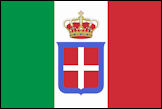
Vertrag mit dem Königreich Italien.
Abb.: Königreich Italien (1866 noch ohne Kirchenstaat)
[Bildquelle: Wikipedia. -- Public domain]
1868
Fertigstellung des Khlong Damnoen Saduak (คลองดำเนินสะดวก) der mit einer Länge von ca. 35 km die Flüsse Tha Chin (แม่น้ำท่าจีน) und Mae Klong (แม่น้ำแม่กลอง) verbindet.
Abb.: Lage des Khlong Damnoen Saduak (คลองดำเนินสะดวก)
[Bildquelle: OpenStreetMap. -- Creative Commons Lizenz (Namensnennung, share alike)]
1868
คุณพุ่ม [Khun Phum]: เพลงยาวเฉลิมพระเกียรติ [Loblied auf Rama III. und Rama IV] (Khun Phum ist eine Hofdame, die bekannt ist für ihre Dichtung und ihren Witz).
1868


Die Baptisten übergeben die Mission an den Siamesen und Laoten an die Presbyterianer und behalten nur noch die Mission an den Chinesen Siams.
1868 - 1872

Es erscheint die Zeitung Bangkok Daily Advertiser
1868 - 1871

Es erscheint die Zeitung Siam Daily Advertiser / hrsg. von US-Missionar Samuel John Smith (1820-1909)
1868 - 1871

Es erscheint die Zeitung Siam Weekly Advertiser / hrsg. von US-Missionar Samuel John Smith (1820-1909)
1868 - 1879
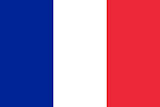
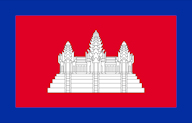
Jean Moura <1827 - 1885> ist französischer Resident in Kambodscha.
Abb.: Jean Moura, 1883
[Bildquelle: Eugène de Paris, Toulon]
1868
Es erscheint:
Bastian, Adolf <1826 - 1906>: Reise durch Kambodja nach Cochinchina. -- Jena : Costenoble, 1868. -- 436 S. -- (Die Völker des östlichen Asien ; Bd. 4). -- Über seine Reise 1863
Adolf Bastian ist ein deutscher Völkerkundler sowie Gründungsdirektor des Museums für Völkerkunde in Berlin.
Abb.: Adolf Bastian als Corps-Student, 1846
[Bildquelle: Academische Monatshefte 9 (1892/93), S. 389 / Wikimedia. -- Public domain]
1868

Stapellauf des britischen Klippers Thermopylae. Es ist der schnellste Klipper auf der Route China - Europa.
Abb.: Thermopylae / von M. Reilly
[Bildquelle: Wikimedia. -- Public domain]
1868-12-10

In London (Großbritannien) gibt es auf dem Parliament Square erstmals eine Verkehrsampel (Gaslicht) mit Rot-Grün-Licht. Sie explodiert bereits 1869-01. Daraufhin werden erst 1912 wieder Lichtsignalanlagen zur Verkehrsregelung eingesetzt.
Abb.: Verkehrsampel, Krabi, 2010
[Bildquelle: Steve Calcott. -- http://www.flickr.com/photos/17537227@N00/4779932458. -- Zugriff am 2013-10-31. -- Creative Commons Lizenz (Namensnennung, keinekommerzielle Nutzung)]
1868-01-03

Mutsuhito (睦仁) wird unter dem Herrschernamen Meiji (明治天皇. 1852 - 1912) der 122. Tennō (天皇, Himmlischer Herrscher) von Japan. Ende des Shogunats (幕府). Meiji-Restauration (明治維新).
Abb.: Meiji (明治天皇), 1873
[Bildquelle: Wikipedia. -- Public domain]
"Als Meiji-Zeit, Meiji-Ära oder Meiji-Periode (jap. 明治時代 Meiji jidai) wird in der japanischen Geschichte der Zeitraum der Regentschaft des Tennōs Mutsuhito (Meiji-tennō) definiert. Er umfasst den Zeitraum vom 25. Januar 1868 bis zum Tod des Kaisers am 30. Juli 1912. Mutsuhito wählte als Titel das Motto seines Regierens: Meiji (deutsch: „aufgeklärte Herrschaft“). Beginnend mit der Meiji-Restauration wurde aus dem rückständigen Feudalstaat Japan eine moderne imperiale Großmacht. Die Entwicklung, die Japan in der Meiji-Zeit durchlief, ist daher grundlegend für die heutige Bedeutung des Landes in der Welt." [Quelle: http://de.wikipedia.org/wiki/Meiji-Zeit. -- Zugriff am 2015-05-01]
"Meiji-Restauration (jap. 明治維新, Meiji ishin) bezeichnet formal die Erneuerung der kaiserlichen Macht zu Beginn der Meiji-Zeit und beinhaltet darüber hinaus nicht nur die Schaffung eines neuen politischen Systems in Anlehnung an westliche Vorbilder, sondern auch die völlige Umgestaltung der japanischen Gesellschaft. Eng gefasst endet diese Phase mit dem letzten Widerstand Saigō Takamoris [西郷 隆盛] 1877, als eigentlichen Abschluss kann man das Inkrafttreten der Verfassung 1890 ansehen." [Quelle: http://de.wikipedia.org/wiki/Meiji-Restauration. -- Zugriff am 2015-05-01]
1868-02-27 - 1868-12-01

Benjamin Disraeli (1804 - 1881) ist Prime Minister Großbritanniens.
1868-03-31

Paris: Erstes offizielles Straßenradrennen der Welt.
1868-04-07

Anlässlich der Inthronisation des Meiji-Tenno (明治天皇) wird der Fünf-Punkte-Eid (五箇条の御誓文) promulgiert:
Abb.: Offiziell veröffentlichte Form des Fünf-Punkte-Eids (五箇条の御誓文)
[Bildquelle: Wikimedia. -- Public domain]
By this oath, we set up as our aim the establishment of the national wealth on a broad basis and the framing of a constitution and laws. 1. Deliberative assemblies shall be widely established and all matters decided by open discussion. 2. All classes, high and low, shall be united in vigorously carrying out the administration of affairs of state. 3. The common people, no less than the civil and military officials, shall all be allowed to pursue their own calling so that there may be no discontent. 4. Evil customs of the past shall be broken off and everything based upon the just laws of Nature. 5. Knowledge shall be sought throughout the world so as to strengthen the foundation of imperial rule. [Quelle der Übersetzung: http://en.wikipedia.org/wiki/Charter_Oath. -- Zugriff am 2013-10-05]
1868-04-16 - 1868-10-11

Siam nimmt an der Exposition Internationale Maritime in Le Havre (Frankreich) teil.
Abb.: Lage von Le Havre
[Bildquelle: OpenStreetMap. -- Creative Commons Lizenz (Namensnennung, share alike)]
Abb.: Stand Siams an der Exposition internationale maritime in Le Havre , 1868
1868-08-03 - 1917-05-17
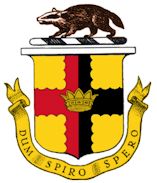
Charles Anthoni Johnson Brooke (1829 - 1917) ist der zweite Rajah von Sarawak.
Abb.: Charles Anthoni Johnson Brooke / von Leslie Ward (1851 - 1922)
[Bildquelle: Wikipedia / Vanity Fair. -- 1899-01-19]
Abb.: Lage von Sarawak
[Bildquelle: Bartholomew, J. G. <1860 - 1920>: A literary & historical atlas of Asia. -- London, o. J.]
1868-08-18

König Mongkut beobachtet in Wa Ko (หว้ากอ), Prachuab Khiri Kan, die totale Sonnenfinsternis, die er exakt vorausberechnet hatte. Dabei erkrankt er an Malaria, an der er stirbt.
Abb.: Lage von Wa Ko (หว้ากอ)
[Bildquelle: OpenStreetMap. -- Creative Commons Lizenz (Namensnennung, share alike)]
Abb.: Das königliche Lager in Wa Ko (หว้ากอ)
[Bildquelel: Mrs. Kennedy, 1868]
Abb.: Fernrohr König Mongkuts
Abb.: König Mongkut mit seinen Gästen in Wa Ko (หว้ากอ), 1868-08-18
Abb.: Verlauf der Sonnenfinsternis vom 1868-08-18
[Bildquelle: NASA / Wikipedia. -- Public domain]
Abb.: Aufnahme der totalen Sonnenfinsternis in Wa Ko (หว้ากอ), 1868-08-18 durch den Hoffotografen Francis Chit
"Die totale Sonnenfinsternis vom 18. August 1868 spielte sich hauptsächlich im südlichen Teil Asiens ab. Ihre maximale Totalitätsdauer war mit 6 Minuten und 47 Sekunden ausgesprochen lang. Während dieser Finsternis entdeckte der Astronom Jules Janssen im Sonnenspektrum eine Emissionslinie, die keinem bisher bekannten Element zuzuordnen war. Dieses zunächst nur im Sonnenspektrum nachgewiesene Element wurde später Helium (altgr. ἥλιος hélios „Sonne“) benannt. Zu den Beobachtern zählte auch König Mongkut von Siam, der Ort und Zeitpunkt dieser Sonnenfinsternis eigenhändig berechnet hatte. Diesen wissenschaftlichen Erfolg bezahlte er allerdings mit dem Leben, nachdem er sich während seiner Beobachtungen mit Malaria infiziert hatte. Die ausgesprochen lange Totalität erklärt sich dadurch, dass der Neumond weniger als sieben Stunden nach dem Perigäum eintrat[1] – der scheinbare Durchmesser des Mondes war also recht groß – und zudem die Finsternis sich nahe dem Äquator abspielte – wo die Drehbewegung der Erdoberfläche mit größtmöglicher Geschwindigkeit dem Schatten sozusagen „hinterherläuft“ und somit die Totalitätsdauer verlängert wird. Die Sonnenfinsternis ist die zweitlängste Finsternis des Saros-Zyklus 133. Sie gehört zu den mittleren Finsternissen dieses Zyklus und wird nur von der vorausgehenden Finsternis des Zyklus vom 7. August 1850 übertroffen, deren Totalität mit 6 Minuten und 50 Sekunden noch 3 Sekunden länger war.
[...]
Der König von SiamDer wohl prominenteste Beobachter der Sonnenfinsternis war Mongkut (Rama IV.), der König von Siam, dem heutigen Thailand. Bevor er 1851 den Thron besteigen konnte, lebte er viele Jahre zuerst als Mönch und später als Abt im Kloster Wat Bowonniwet. Dort befasste er sich intensiv mit westlicher Kultur, Sprachen und Wissenschaften, insbesondere mit der Astronomie. Mit Hilfe dieser Kenntnisse berechnete er Ort und Zeitpunkt der Sonnenfinsternis zwei Jahre im Voraus. Seine Hofastrologen allerdings hielten die Berechnungen für falsch.[16]
In der Nähe des Dorfes หว้ากอ (Waghor) in der Provinz Prachuap Khiri Khan ließ er im Dschungel eine freie Fläche roden und einen großen Beobachtungspavillon nebst zahlreichen Beherbergungsgebäuden errichten.[17] Der Ort lag annähernd dort, wo die Zentrallinie der Finsternis die Küstenlinie schnitt. Er war somit nicht nur von den königlichen Dampfschiffen leicht erreichbar, sondern es war auch der Ort des thailändischen Festlandes mit der längsten Totalitätsdauer, da das Maximum etwa acht Minuten später über dem Golf von Thailand eintrat. Zur Beobachtung lud er zahlreiche ausländische Würdenträger ein, unter anderem Sir Harry Ord, den Gouverneur der Straits Settlements (Singapur).[18]
Knapp zwei Kilometer südwestlich hatte auch eine Gruppe französischer Wissenschaftler eine Beobachtungsstation errichten lassen. Es war nicht leicht gewesen, dafür bei den Behörden in Bangkok eine Genehmigung zu bekommen. Die zuständigen Beamten konnten kaum glauben, dass solche Mühen und Kosten aufgewendet würden, um ein Ereignis zu beobachten, das nur wenige Minuten dauern sollte. Am 25. Juli trafen die Wissenschaftler Édouard Jean-Marie Stephan, Georges Rayet und Félix Tisserand bei ihrem Beobachtungsstand ein. Sie stellten Fundamente für eine Vielzahl von Instrumenten her, um präzise Messungen zu ermöglichen.[2]
Wenige Tage vor der Sonnenfinsternis landete auch Mongkut mit einer Flotte von zwölf Dampfschiffen der königlichen Marine, auf dem Landweg kamen außerdem fast tausend Personen seines Hofes, die viele Rinder, Pferde und fünfzig Elefanten mitbrachten.[16] Der König besuchte die französische Station und schrieb anschließend einen Brief an Stephan, in dem er seine Bewunderung für die moderne Ausrüstung bekundete und Details über seine astronomischen Kenntnisse erwähnte.[2]
Zur Genugtuung des Königs entsprach die Sonnenfinsternis exakt seinen Berechnungen. Während die französischen Forscher ein ausgeklügeltes Programm mit Messungen und Beobachtungen abspulten[2], ließ König Mongkut Fanfaren blasen und eine Kanone abfeuern und vollführte ein zeremonielles „Bad der Reinigung“.[16] Nach der Rückkehr in seinen Palast stellte er die Hofastrologen zur Rede und ließ sie, als sie ihr Fehlurteil nicht erklären konnten, zur Strafe erniedrigende Arbeiten ausführen.[19]
Allerdings wurden der König und sein Sohn Chulalongkorn bald darauf von schwerem Fieber befallen. Die Beobachtungsstation lag in einem Gebiet voller Mückenschwärme, die viele Anwesende mit Malaria infiziert hatten. Mongkut erlag der Krankheit zwei Monate später. Sein Sohn überlebte und bestieg noch im selben Jahr den Thron.[17]
König Mongkut erhielt aufgrund seiner Impulse zur Modernisierung den Beinamen „Vater der Wissenschaften“. In der Nähe der Beobachtungsstationen (sie sind nicht mehr auffindbar) steht heute der King Mongkut Memorial Park of Science and Technology 11° 43′ N, 99° 46′ O."
[Quelle: http://de.wikipedia.org/wiki/Sonnenfinsternis_vom_18._August_1868. -- Zugriff am 2013-01-16]
Der geschäftsführende britische Konsul Henry Alabaster (1836 - 1884) berichtet an das Foreign Office:
"The King was very anxious that some high British official should be present and having learnt from me that Colonel Sir Harry Ord [1819 - 1885], the Governor of the Straits Settlements, would probably accept an invitation to meet His Majesty there - gladly sent an invitation which Sir Harry Ord has gladly accepted - I enclose the original not of His Majesty, His Majesty left the capital about a fortnight previous to the eclipse. "In the meantime the Prime Minister (Kalahome [กลาโหม]) and his lieutenants erected quite a town in the distant jungle to which we were about to resort and, in order that the King's guests might lack nothing, a French cook with about forty European and Chinese assistants was sent to organise a kitchen. A steamer was kept running for some weeks conveying stores; and the mail steamer diverted from its course in order to bring luxuries from Singapore.
"Fearing that the desertion of the capital by the majority of the officials, the removal of all the gunboats, etc. might tempt disorderly Chinese to make a riot - I suggested an increase of the Police. My suggestion was adopted, the force doubled and police stationed throughout the part of Bangkok which may be called the Foreign Settlement.
"On the 12th instant I left in the finest gunboat in the Siamese navy, the "Impregnable" of Captain Walrond. The French Consul, not being prepared to go on that date, did not go at all though two other vessels were subsequently offered to him. With me were my wife, Mrs. Campbell, Mrs. Kennedy and Gould of the Consulate, and two British merchants. A large party of Europeans and Americans including the United States Acting Consul were allowed passage in the same vessel.
"On arrival on the morning of the 14th I received a message from the Prime Minister requesting me to remain on board until every one else had landed as the King wished to give me an official reception. I did so, and, on landing, was received at the end of the pier by the second Foreign Minister and other officers and forthwith conducted to the outer gate of the Palace where the King, surrounded by his family and ministers cordially welcomed me and proceeded to fire a salute of seven guns with his own hand - an extraordinary honour - His Majesty stood to the guns, watch in hand, and fired with the most perfect precision, saying he would show his officers how to keep time. His Majesty then led me across the courtyard of the Palace to a spacious Audience Hall, and, while refreshments were served, conversed for sometime about the eclipse, showing a knowledge of the subject I was unprepared to expect. After the audience the Prime Minister led me to his house and thence to that erected for me close beside his own.
"It is remarkable and yet only consistent with the whole course of hospitality shown by the Siamese government on this occasion that the Siamese ministers did not provide for themselves the comfortable accommodation provided for their guests. The Prime Minister himself rather than allow any beyond my own party to take up rooms in my house gave up room after room his house - until it became a hive of European and American ladies and gentlemen; his reception room became a club and he had only a bedroom to himself. When I brought away some of his too numerous guests he fetched them back and it was only after some resistance he agreed that they should take their meals with us. Knowing His Excellency well I know what an effort it must have cost him to show such nobleness to the foreign ladies who had uninvited and unexpected come down upon him in such numbers. His Excellency's attention continued and time after time he called to learn whether anything was desired. Other Siamese officers vied in offering facilities. Such hospitality, such attention as was shown to us I have never seen anywhere before, never expect to see again.
"But all this time there were two sources of uneasiness; first, the weather had been for some time stormy and the sky overcast, and, though it improved on the 15th there was a general expectation that we should not see that which we had come to see; second, the French were complaining and dissatisfied and said the Siamese were so suspicious of them that they would give them no assistance. (This was unfair; the Siamese, if I was not misinformed, wanted to do everything for them even to feeding them). As an instance of what resulted I may mention the following. Mr. Pierre the botanist of the expedition wished to make a journey. "The jealous Siamese, ” said some, "gave him no carts of assistance believing he came to spy out the land. " I asked him whether he had applied for them. He said no. His chief had determined to take nothing from the Siamese so had refused to apply for any assistance for him. I spoke of it unofficial to a Siamese officer and in a few hours the gentleman was sent on his way rejoicing with three carts and ten coolies.
“For this and some other little services I had the fortune to render M. Pierre I am to have the pleasure of receiving a duplicate set of the plants collected by him (embracing he believes more than 200 new varieties) which I shall forward to the Kew Museum. Also my name or my present official position is to be immortalized by being attached to a remarkable rush that grows in muddy holes in Siam. I believe it was only the irritating cloudy sky that caused the ill will for as the weather improved it all passed away.
"On the 15th the Emperor Napoleon's fete day was celebrated, all the ships dressed gaily and many salutes were fired. The Chief of the French expedition and the French Consul had not been able to agree as to their respective positions in regulating the ceremonials of this day, which was one of the reasons that the French Consul remained at Bangkok.
"On the 16th the Governor of Singapore arrived in his yacht the "Peiho" but as it was Sunday deferred landing until the morrow. Early on the morning of the 17th H. M. S. "Satellite" Captain Edge arrived and at 11 o'clock Colonel Ord, Captain Edge and their suites landed under a salute of seventeen guns from the shoe battery, and were at once conducted to the Prime Minister, where HRH the Foreign Minister also awaited them. In the meantime the King conceived that it would be well to establish a second observatory some miles distant and himself started off to select the spot. We waited nearly three hours until His Majesty returned and invited our attendance.
Abb.: Sir Harry Ord
[Bildquelle: Wikimedia. -- Public domain]"Colonel Ord was received with as much pomp as the situation admitted of. A line of soldiers presented arms on his approach and the King received him seated on a temporary throne with about two hundred princes and officers in brilliant silk and gold jackets kneeling around him. I presented His Excellency, Captain Edge and their officers and the King then introduced them to the chief princes and nobles.
''The conversation was limited to formal civilities and expressions of the satisfaction the visit gave His Majesty. As soon as the ceremony was over the King willingly submitted to have some photographs taken of himself surrounded by his guests.
"This ended, Colonel Ord was conducted to the residence built for him and a very excellent tiffin served up. Colonel Ord's house was next in size to the King's Palace and I think the supply of provisions and wines etc. was not inferior to any I have seen or heard of on Colonial Governor's tables. The wines indeed were the best procurable.
"In the evening Colonel and Lady Ord, Captain Edge, I and my wife, etc. and in all a party of eight were entertained in the interior of the Palace and introduced to His Majesty's children and nine of the favourite ladies of the Palace, and, next morning, the unprecedented intimacy allowed us with the Royal Family so increased that they threw off all
customary reserve and while the King and several of His Majesty's wives were conversing with Colonel and Lady Ord in one room; in the adjoining audience hall I and other gentlemen were talking for full three quarters of an hour with the princesses - several of the latter young ladies of 15 to 18."The pleasant manners of these young princesses and the frankness and intelligence of their conversation exceeded my anticipations. They spoke the simplest language but sifted of the rough and coarse expressions which are so general as to be almost a feature of the Siamese language. To those with me who could not speak Siamese they spoke a few words of English. His Majesty, one of the kindest of fathers heard the run of conversation and the frequent ringing peals of laughter and accepted it with perfect good humour, smiling, as he said on his return, "What a noise you have been making. "
"The whole time was as it were spent on a picnic. For once the Siamese laid down the screen they ever hold at Bangkok between foreigners and themselves and I hope that their doing so has given them more confidence in foreigners as it has given foreigners a much increased esteem for them. In the afternoon the King's eldest son rode out with a large party of foreigners including several of the younger of the "Satellite"; and another party of foreigners were delighted with an elephant ride.
"Then came the eventful day. As soon as day broke a busy crowd might be seen mounting their telescopes in front of the houses, and, as the clouds chased across the sky, thickening every hour, the excitement became intense. A gun announced the commencement of the eclipse, but the earlier stages were but imperfectly seen. Suddenly as the total phase was about to commence the warm air from the earth seemed to fly up direct towards the sun, through the chilled air above, scattering the clouds over our heads, and the glorious corona and its scarlet heads and fountains burst forth with splendid clearness.
"A roar of wonder and delight rose from the whole colony. The Prime Minister is said to have run into his house and called to his wives “now will you believe in what foreigners tell you. '' I shall attempt no description of the eclipse itself that will be given by the French astronomers but I may note its effect on myself and those round me. My party all felt subdued and somewhat hysterical; a party of missionaries a short way off cheered violently. The Siamese after their first roar of wonder sat silent, the women half-frightened; some native women ran into their houses. The Prime Minister ran about like a younger man and was running with me to my observatory when the sun burst forth again. He took me in at once to the King and I sat down with the rest of the council who had already assembled. Again the screen was dropped: the King and his ministers sat round smiling, talking and even joking, phrases of ceremony were cut down to the shortest, freedom of speech allowed to the utmost. The King gave a full and clear account of the causes of the eclipse showing how thoroughly he had read up the subject. He finally presented me with a gold coin (a custom of Siam on remarkable occasions) and the interesting meeting broke up. In the meantime Colonel Ord and his party had made some observations of the eclipse but not such as to be of any scientific value beside observations made by practical French astronomers working with the finest instruments.
''In the afternoon the King visited Colonel Ord at his residence, an act of remarkable condescension.
"In the evening Colonel Ord was entertained with a theatrical presentation. Next morning His Majesty and guests again underwent the photographic operation, and immediately after the Town of the Eclipse melted away like a snow heap in the sun."All the non-official foreigners had left immediately after the eclipse. The King left at about noon on the 19th; steamers and sailing yachts crowded to excess hurried off immediately after. The "Satellite" steamed away to China, the French "Frelon" having preceded her to Saigon with the news of the great success.
"Colonel Ord decided to embark in the afternoon, and I should have been pleased to have escorted him on board but, unwilling to retain longer the "Impregnable", which had been again placed at my service, I took my leave of His Excellency and, embarking simultaneously with the Prime Minister, we started homewards leaving the dismantled town where I had experienced such vast hospitality, been allowed such extraordinary intimacy, and witnessed the grandest of astronomical phenomena. "
[Zitiert in: Manich Jumsai [มานิจ ชุมสาย] <1908 - 2009>: History of Anglo-Thai relations. -- 6. ed. -- Bangkok : Chalermnit, 2000. -- 494 S. : Ill. ; 21 cm. -- S. 106 - 114]
1868-08-27

Sir Harry Ord (1819 - 1885), Governor of the Straits Settlements, an Richard Plantagenet Campbell Temple-Nugent-Brydges-Chandos-Grenville, 3rd Duke of Buckingham and Chandos (1823 - 1889), Secretary of State for the Colonies, über seinen Empfang durch Rama IV. anlässlich der Sonnenfinsternis:
Abb.: Richard Plantagenet Campbell Temple-Nugent-Brydges-Chandos-Grenville, 3rd Duke of Buckingham and Chandos
[Bildquelle: Carlo Pellegrini (1839 - 1889). -- In: Vanity Fair. -- 1875-05-29]
"His Majesty was in full dress seated on a throne... His Majesty beckoned me to approach him at once, and after shaking hands with me... he addressed me in English, which he speaks with great facility, expressing the pleasure it gave him to make my acquaintance - that owing to our position on the Peninsula the relations between his country and the Straits Settlements were necessarily very intimate, and that he hoped the meeting between us would strengthen the bond of friendship which had so long existed between the British and the Siamese governments. He added that it was his wish and that of his ministers to do everything that would be agreeable to us - that he himself having been brought up in the priesthood for many years had devoted himself chiefly to scientific pursuit and did not take so great an interest in politics, but that I should always find the Kalahome [กลาโหม] ready to attend to any communication I might make to him on any matter affecting our relations in the peninsula. On taking our departure His Majesty expressed his wish to receive us at a private audience the same evening, and we then proceeded to the house prepared for us, where we found a table furnished in European style with every luxury attainable in these climates - a numerous establishment of French and native cooks and servants awaited our orders and we were informed that we were the King's guests and that His Majesty trusted that all we needed was provided for us. Nothing could be more liberal than our entertainment and we ascertained that the whole of the Europeans present were similarly entertained during the entire period of their stay at Whaewhan.
We visited His Majesty in the evening, and were received by him in the most courteous manner - the private apartments of the palace were thrown open and we were introduced to the Household and the Royal Children amongst whom we found a considerable number, especially of the Princesses speaking English.
In the afternoon (of the following day, soon after the eclipse) sitting with us, the Kalahome suddenly presented himself and announced that the King was on his way to visit me. Immediately afterwards His Majesty arrived in considerable state with a Guard of Honour, band and field pieces, but was accompanied by several of his children and all the principal members of the Court and seemed in excellent spirits, it having proved, as he informed, me, that his calculation of the time of the occurrence of the eclipse was more accurate than that given by the French astronomers. On his departure he invited us to visit him at the palace the same night to witness some native theatrical performances.
The following morning we were again summoned to the palace where His Majesty and some of the Court sat for their photographs. The King then invited Lady Ord and myself, Captain Edge, and Major M. Nair to enter the interior of the palace and take a farewell of the inmates. This we did and after a long and interesting conversation with the King, in which he repeated his professions of regard for our Nation, and assured us that nothing should be wanting on his part to maintain the friendly and cordial relations which existed between our governments, he permitted us to take our departure.
The same afternoon His Majesty and the court took their departures in the Royal and other yachts for Bangkok.
I believe that much benefit will result from this visit - it will tend to strengthen the good feeling existing between Siam and Her Majesty's government and will render easier the settlement of those questions to which our position on the peninsula must from time to time give rise.It has had the effect of calling forth an exhibition of regard for our nation on the part of the King such as was hitherto unknown in the annals of Siam. This Court has been heretofore notorious one in which the observances of etiquette have been carried to the most extreme length and the accounts of Mr. Crawfurd's and Sir John Bowring's Missions
exhibit clearly the inconvenience and difficulties to which they were subjected from it. In the present instance all the traditions and customs of the kingdom seem to have broken through by the mere will of the King, and in order to testify his regard for our nation. Our admission into the private apartments of the palace is an honour which I believe was rarely, if ever, been accorded to a European, whilst I understand the King's visit to me has no parallel in their history."[Zitiert in: Manich Jumsai [มานิจ ชุมสาย] <1908 - 2009>: History of Anglo-Thai relations. -- 6. ed. -- Bangkok : Chalermnit, 2000. -- 494 S. : Ill. ; 21 cm. -- S. 115 - 118]
1868-09-28
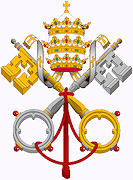
Ein katholischer Missionar über die katholischen Vietnamesen in Siam:
"All our Christians are under arms either in the palace or on ships of war." [Übersetzt in: Battye, Noel Alfred <1935 - >: The military, government, and society in Siam, 1868-1910 : politics and military reform during the reign of King Chulalongkorn. -- 1974. -- 575 S. -- Diss., Cornell Univ. -- S. 104]
1868-10
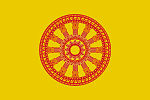
Letzter Brief Mongkuts, geschrieben auf dem Sterbebett, gerichtet an den Mönchsorden. Original in Pali:
"May My Lords of the Holy Brotherhood pay attention to the fact that while I was in Holy Order I was wont to say that, since I was born on the Day of Great Dedication, if I should be nearing the time of my death and should my illness show signs of increasing graveness on the Day of Great Dedication, would some Holy Brothers and novices help to carry my person into the presence of the Assembly of the Holy Brothers, gathered for the Dedication Ceremony in the Uposatha Assembly Hall? With whatever strength that might be left in my body at the time, I would thrice dedicate myself to the Holy Order and then would meet my death in the presence of the Holy Brotherhood. Such action, were I in the position to carry it out, would be a good action. That action, if performed by me, would be appropriately performed. Such words did I oft say while I was a mendicant priest. Now that I have become a layman, what can I do? For this reason have I sent tokens of veneration to the Vihara, to be humbly placed before the Holy Brothers in congregation for the Dedication Ceremony and before the Dharma. These tokens shall represent myself.
This Day of Great Dedication having fallen upon a Thursday, the same as on the day I was born, and my illness being extremely grave, I fear that my time will at last come upon me today. I beg to take leave of My Lords of the Holy Brotherhood. I lift up my hands in veneration of the Illustrious One, Who has attained the Perfect Wisdom, even though He has long reached Nirvana. I lift up my heart in worship of the Law. I bow before the True Disciples of the Lord Buddha. I have reached my refuge in the Triple Gems.
For whatever offenses committed by me, who have erred, who have been ignorant and who have been unwise in various ways, I beg to admit their causes to the lack of diligence on my part. For the future composure of their minds, may the Holy Brothers accept my past offenses as a warning unto themselves.
At the present moment my mind is firmly resolved in the Five Precepts. I am attentive to the following Truth, that the five Constituent Elements of Being, the six Internal Means of Communication, the six External Means of Communication, the six forms of Consciousness, the six senses and the six sensations through the six channels are merely illusory. Hence no man can, without offense, hold as reality any worldly thing. I believe that all worldly manifestations are impermanent and that all worldly sensations and perceptions are not identifiable to self, being variable according to circumstances. That is to say, such things as we deem ours are not ours, and such beings as we deem us are not ourselves. The death of all beings is not to be wondered at, since death is natural to all things.
I beg of My Lords to dwell always in diligence. I beg to take leave of you. I salute you. As a favour unto me, I beg of My Lords to bear patience with me in my past offenses.
Even though my body is suffering, my mind is at rest.
Thus have I followed the Teaching of Buddha."
[Zitiert in: Moffat, Abbot Low <1901 - 1996>: Mongkut, the king of Siam. -- Ithaca N.Y. : Cornell UP, 1961. --254 S. : Ill. ; 23 cm. -- S. 180f.]
1868-10-17

Tod von König Rama IV. (17. Oktober 1804 - 17. Oktober 1868)
Abb.: Todesanzeige von König Mongkut für das westliche Ausland, 1868-10
[Bildquelle: ศกดา ศิริพันธุ์ = Sakda Siripant, 2012. -- S. 36]Gedruckter Text der Todesanzeige von König Mongkut für das westliche Ausland:
Abb.: Reliquienschreine für Rama I., Rama II., Rama IV., Varadis-Palast (วังวรดิศ), BangkokDie Kremation Ramas IV. (1870?) kostet $150.000.

Anlässlich des Tods von Rama IV. schreibt der Missionar Samuel Reynolds House (1817 - 1899):
"Western friends lost a royal friend who had opened the gates of his kingdom for intercourse.... The mission lost, some of them a kind personal friend and a ‘well-wisher’ as he used to sign himself, and all a friendly- disposed liberal minded sovereign, who put no obstacle in the way of their evangelizing his people." [Zitiert in: Manich Jumsai [มานิจ ชุมสาย] <1908 - 2009>: Popular history of Thailand. -- Bangkok : Chalermnit, 1972. -- S. 488]
ausführlich: http://www.payer.de/thailandchronik/ressourcen.htm
Moffat, Abbot Low <1901 - 1996>: Mongkut, the king of Siam. -- Ithaca N.Y. : Cornell UP, 1961. --254 S. : Ill. ; 23 cm.
Blofeld, John <1913 - 1987>: King Maha Mongkut of Siam. -- 2. ed. -- Bangkok : Siam Society, 1987. -- 97 S. : Ill. ; 22 cm.
Chula Chakrabongse [จุลจักรพงษ์] <1908 - 1963>: Lords of life : History of the Kings of Thailand. -- 2., rev. ed. -- London : Redman, 1967. -- 352 S. : Ill. ; 22 cm.
Phongpaichit, Pasuk <ผาสุก พงษ์ไพจิตร, 1946 - > ; Baker, Chris <1948 - >: Thailand : economy and politics. -- Selangor : Oxford Univ. Pr., 1995. -- 449 S. ; 23 cm. -- ISBN 983-56-0024-4. -- Beste Geschichte des modernen Thailand.
Terwiel, Barend Jan <1941 - >: A history of modern Thailand 1767 - 1942. -- St. Lucia [u. a.] : Univ. of Queensland Press, 1983. -- 379 S. ; 22 cm.
Ingram, James C.: Economic change in Thailand 1850 - 1870. -- Stanford : Stanford Univ. Pr., 1971. -- 352 S. ; 23 cm. -- "A new edition of Economic change in Thailand since 1850 with two new chapters on developments since 1950". -- Grundlegend.
Akira, Suehiro [末廣昭] <1951 - >: Capital accumulation in Thailand 1855 - 1985. -- Tokyo : Centre for East Asian Cultural Studies, ©1989. -- 427 S. ; 23 cm. -- ISBN 4896561058. -- Grundlegend.
Skinner, William <1925 - 2008>: Chinese society in Thailand : an analytical history. -- Ithaca, NY : Cornell Univ. Press, 1957. -- 459 S. ; 24 cm. -- Grundlegend.
Simona Somsri Bunarunraksa [ซีมอนา สมศรี บุญอรุณรักษา]: Monseigneur Jean-Baptiste Pallegoix : ami du roi du Siam, imprimeur et écrivain (1805 - 1862). -- Paris : L'Harmattan, 2013. -- 316 S. : Ill. ; 24 cm. -- (Chemins de la mémoire ; Novelle série). -- ISBN 978-2-336-29049
Morgan, Susan <1943 - >: Bombay Anna : the real story and remarkable adventures of the King and I governess. -- Berkeley [u.a.] : Univ. of California Press, 2008. -- 274 S. : Ill. ; 23 cm. -- ISBN 978-0-520-26163-1
ศกดา ศิริพันธุ์ = Sakda Siripant: พระบาทสมเด็จพระจุลจอมเกล้าเจ้าอยู่หัว พระบิดาแห่งการถ่ายภาพไทย = H.M. King Chulalongkorn : the father of Thai photography. -- กรุงเทพๆ : ด่านสุทธา, 2555 = 2012. -- 354 S. : Ill. ; 30 cm. -- ISBN 978-616-305-569-9
Lavery, Brian: Schiffe : 5000 Jahre Seefahrt. -- London [u. a.] : DK, 2005. -- S. 184. -- Originaltitel: Ship : 5000 years of marine adventure (2004)
Zu Chronik 1868-11 - 1868-12 (Rama V.)